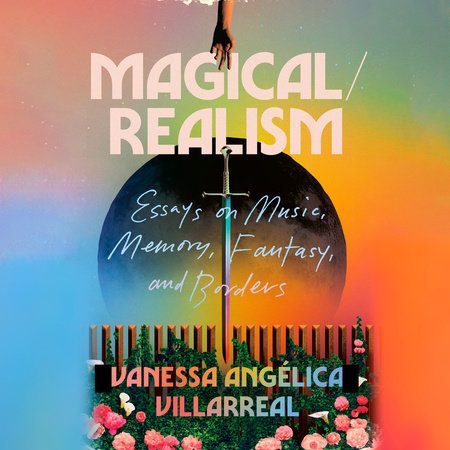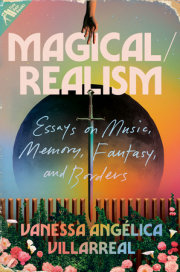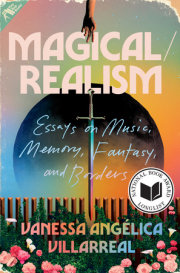T
HAT NEVER HAPPENED. 12345678X
1. In the end, this is the phrase I remember most from my marriage: a phrase that echoes through time, tying my marriage to my foremothers’ marriages, my story to their stories, their stories a missing record in history, a history I can never reclaim. What is memory but a battleground, a bordered terrain between two versions of the truth?
2. Self-Erasure: And before that, there was the word Papi said to me at fourteen: compónete. Compónete ya, por favor. Fix yourself now, please, said in defeat. It was no longer the pórtate bien from my childhood. Puros pinches problemas, he would say, wishing for a more obedient, feminine, respectable daughter. Fast-forward to me at thirty-seven, standing in someone else’s dream: on the rim of the Pacific Ocean with a baby in my arms, married to a stranger who despised me, about to start a doctoral program. All surreal outcomes for the troubled teen with a past; at last I had fixed myself, me compuse. I’d become una mujer recta, casada, a mother, a college graduate, living the so-called American Dream.
It was a life I created in apology to my parents, the dream that I would live a decent life and never know struggle, a trap I rebelled against. Para que nunca tengas que batallar. I’d only ever repaid their sacrifices with sabotage, so to make it up to them, I erased the problems, the color, the wildness, and created the buen hija they could be proud of, living out the grand narratives of what a “better life” meant to them: assimilation to whiteness, cis-heteronormativity, bootstraps individualism, mestizaje, Manifest Destiny, and the earliest one little girls are taught to believe, Happily Ever After. These too are fantasies, the grand narratives that execute inside us without much thought until at midlife, something inevitably begins to fail.
3. MEMORY LOSS: When we moved to Los Angeles in 2016, the final year of my marriage, I was a new mother in the first year of my PhD program, and writing my first book. But my mind was in pieces, and time slipped through some enormous, yawning wound I could not close. One of the more concerning symptoms I reported before receiving a PTSD and ADHD diagnosis was the feeling that, since having the baby, I was living in a state of unreality, or chirality—as if my home, my body, and my life only existed on the other side of the mirror. Derealization and depersonalization, the nurse called it. It was the same unreality of my adolescence, but now I was the mother, facing much higher stakes. My brain had erected a barrier between me and the profound loneliness of my marriage, a reality that was always shifting on unstable, unknowable ground.
4. When I visualize my memory, I imagine the defrag screen in Windows 95—rows of little blue squares punctured with missing data, the corrupted files speckled throughout in pink and yellow. I loved to defrag my Compaq computer and watch the teal squares turn blue and rearrange themselves. The pink and yellow files were errors, places the file structure was broken, or duplicated, overwritten, deleted. Odd little squares that recorded nothing, invited speculation.
5. My father has cut off all contact with his family, for good reason; on my mother’s side, borders and elders with old grudges have made us all strangers. El árbol empieza aquí, or, the tree starts here, Papi says. As far as he’s concerned, our line begins in 1980, the year he and my mother were married in Reynosa. The family who came before would become unknown and unremembered, and over time, cease to exist.
Another word for starting over is shame, and when shame is combined with the immigrant dream of a “better life,” it’s easy to see how mestizes erase themselves by “starting over,” how entire lineages are lost, disowned, renamed, hidden, disappeared. If I am expected to be the repository of cultural and ancestral memory, the recipe librarian, the secret keeper, what lineage will my child inherit? Not family, not language, not stories, not traditions, nor any sense of a homeland—just absence. Whiteness. To heal the present, I must recover the past. I try to piece our narrative back together from photos, documents, stories, songs—portals into my childhood, my parents’ childhoods, our dead, to the land and their migrations, a line I trace back that ends at a cotton hacienda. Then, No records found. The same result I get from the Demand for Production and Discovery in my divorce proceedings: February through May are missing. Therefore, that never happened. As the ancestral memory I was trying to recover disappeared, my memory was also being erased in the present. I was stranded in time, a field of cotton, a whiteness that covers the land.
6. Perhaps memory loss is the intended result of America. I am a mestiza, a race defined by erasure and negation—not Indigenous, not white, but a national construct of mixedness, one that, according to the casta system, is the halfway point on the way to whiteness. The
hacienda is where our indigeneity ends and “Mexican” begins—an identity born in the field between nations, a ghost in the marrow, trying to remember its name. I grieve this loss. Memory itself is a terra nullius, a land emptied by language and law, laid bare for a man to plant his flag.
7. OVERWRITE: Theory, not therapy, is what helped me begin to make sense of it all. As I studied for exams and raised my child while embroiled in divorce litigation and the world under Trump burned, I encountered the concepts of hauntology, post-humanism, critical fabulation, queer phenomenology, disidentification, the rhizome, racial cartographies, the subaltern, the production of space—language and frameworks that allowed me to remap and reworld my broken reality. But it was the loss of the real, Jean Baudrillard’s concept of the simulacra that shape our reality, that finally separated the layers—the grand narrative, and my real life. He begins Simulacra and Simulation by citing “On the Exactitude of Science,” a short Jorge Luis Borges story about cartographers who draw a map so detailed, the map itself is the size of the empire, an exact replica reproducing the territory point for point, until the map itself covers the land, then becomes the land. “The territory no longer precedes the map, nor does it survive it. It is nevertheless the map that precedes the territory . . .”
Baudrillard used the fabulation and allegory of magical realism to clarify the fiction and violence of borders, the simulation of different nations on either side as a panting black bear paces its length; how the land does not produce borders, but borders themselves produce the land; how empire draws the map until its signifiers replace the land itself. Borders are sites of race-making, nation-building, temporal dislocation—the loss of the real, derealization, and depersonalization. In other words, trauma as I understood it: the moment you lose your reality to someone else’s story.
8. A dark thread pulls behind my navel; the nerve-ghost of my umbilical cord connected to a black, starry pool in my center, the nebula I was connected to before I was born. It is a knowing beyond language. I light candles for my dead, listen for their voices. I write from this starry center; I write what they say until it’s true.
9. Once, a friend invited me over for dinner and put on a vinyl record as background music. In the first nanosecond, the breath the audience takes before the cheers and applause begin, I asked, “Is this Unplugged?” They teased me mercilessly about it—how could I recognize the album from silence, when the song hadn’t even started yet? It was because as a kid, I played those first few seconds over and over to hear Kurt’s voice introduce “About a Girl”: “Good evening. This is off our first record, most people don’t own it.” It stuck with me; something about it radiated truth.
10. Magic and trauma are inextricable; both begin in the language of disbelief; This can’t be real. I can’t believe it. I look out at the wall that 8 extends an imaginary border beyond the land and into the sea, as if it could split the ocean in half. How do you make sense of an incomprehensible world? Baudrillard turned to magical realism to expose the absurdity of empire through fabulist allegory. If trauma is a state of unreality, and grief is a site of magical thinking, then magical realism is both its narrative and interpretive mode.
Copyright © 2024 by Vanessa Angélica Villarreal. All rights reserved. No part of this excerpt may be reproduced or reprinted without permission in writing from the publisher.










